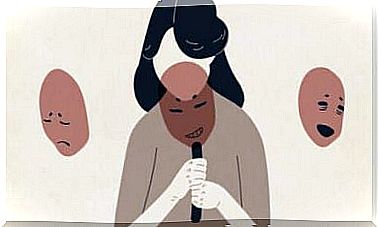7 Emotional Vampires That Rob Us Of Our Wellbeing

Emotional vampires are not satisfied with our blood. They want our vitality, good mood and energy. They lie in wait for us in many places to progressively create dysfunctional environments in which one feels exhausted and isolated that can seriously affect one’s physical and mental health.
Although the term “emotional vampire” does not sound particularly scientific and there is no manual with which we could identify one, there is a popular psychological guide in which the definition of this very specific profile was made, which is not known and tangible to everyone . This guide is Albert J. Bernstein’s Emotional Vampires . We want to use it as a guide and take a closer look at certain aspects of this topic.
“If someone is looking for a trash can to throw their garbage in, it shouldn’t be your mind.”
Dalai Lama
Emotional vampires and their effects on our health
One of these aspects relates to “energy”. It is said about emotional vampires that they rob us of our life energy: If we deal with our fellow human beings and have healthy relationships with them, there is also a harmonious exchange of reinforcing stimuli, information, emotions and sensations. This magic of human interactions always creates a series of changes in the brain, which in turn are accompanied by the release of neurotransmitters and result in a reward. But when we are dealing with an emotional vampire, there is no exchange. Dealing is always unidirectional, there is no flow of communication, no reciprocity that our brain could recognize as healthy and meaningful. What it is instead is an increasing exposure to negative emotions that accumulate day in and day out, causing overstimulation of the brain and a dreadful feeling of stress. Then we either feel completely helpless in a corner or it naturally makes us flee.

We said at the beginning of the article that the term “emotional vampire” was coined by popular psychology, although this personality profile is finding its way more and more into clinical practice and the daily work of countless psychologists. We must remember that the energy we are talking about, which unites our frame of mind, motivation, and self-esteem, enables us to engage in any activity. Thus, a continually negative interaction leads to a painful loss of energy. We would also like to mention that the effects of emotional vampires are much more intense these days due to new technology. The cell phone, which we don’t even turn off at night, is a much used tool of the energy vampire, which thanks to WhatsApp, Facebook or Twitter is now actually constantly present.
There are many types of emotional vampires: there is the work colleague who is always talking to us about his unfortunate circumstances, who whispers nasty rumors or malicious gossip to us, or even the toxic mother or father, toxic relatives who slip into the role of victim and control us in a way that suffocates us in their clutches, in their universes that lack empathy and respect. We could give a thousand examples and still find more, because we all know one of those emotional vampires who robs us of our tranquility, takes our joy and drags us along on his path of discouragement.
Equally important is to mention that all of these tricks work thanks to the specialized nerve cells we all have – the mirror neurons. You play a crucial role in this energy robbery. They force us to pay attention to the emotional vampire and to be sensitive and receptive to everything that he transmits to us: fear, hatred, misfortune, bitterness, worry, etc. The more negative baggage he carries with him, the more energy he takes the more it overstimulates our brain and the greater the stress and weakness.
These symptoms gradually suggest that an emotional vampire is stealing our energy:
- fatigue
- heavy eyelids
- Tension headache
- Dejection
- The feeling of wanting to flee
- Difficulty concentrating
- Low work performance

Types of emotional vampires
Judith Orloff is a well-known North American psychiatrist and author who has dealt with the topics of empathy and emotional contagion and the concept of emotional vampires in numerous books and studies. In their work we can see very clearly that not all people who fit this profile are also aware that they correspond to it and that their interactions and behaviors have negative effects on their fellow human beings. Others, on the other hand, not only know it, but actually strive for it: They want to dominate and thus strengthen their own self-esteem. Knocking down others to make themselves feel bigger is a common strategy used by emotional vampires.
Now let’s look at the seven typologies of emotional vampires.
“He was like a rooster who thought the sun had risen to hear him sing.”
George Elliot
1. The narcissist
His motto is: “Me first.” Everything must have to do with him. These people crave admiration and recognition. They have no empathy and always force us to really shape everything and every aspect that surrounds us according to their expectations, principles and opinions. They have a very limited ability to recognize or consider others in order to be able to give real affection, authentic friendship, or love.
How can we protect ourselves?
- The secret is knowing how to communicate with them, limit them, be sincere, and expose their weary ego and limited ability to consider others.
- We should avoid putting our self-esteem in their hands. To do this, we have to be able to look at them objectively and become aware of their lack of affection and relationship skills.
2. The critic
Nothing you do, say, think, or value is appropriate for a critical personality. Nothing is good enough for the refined taste, for the wise conception of life and the infinite knowledge of the critic. Additionally, caution is advised here, as his greatest ability is to communicate with us with subtle affection and ironic paternalism in order to make us feel inferior to him.

How can we protect ourselves?
- We have to hold up our protective shield and shield these criticisms.
- We have to take power away from the emotional vampires. If we make them understand that their opinions mean little to us and that we know exactly what is good and what is wrong, we will weaken this critical person.
3. The tireless speaker who never listens
The inexhaustible speaker doesn’t care what you have to say, what you think or feel. He just wants you to be there to listen to him, to be that container that he can throw everything into and dump everything into, as if his listener were his landfill that swallows everything.
If you are dealing with a tireless speaker, very intense physical and emotional exhaustion is inevitable.
How can we protect ourselves?
- These people do not respond to non-verbal cues. So there is no other option but to interrupt them in certain but polite ways to make it clear that you are not there, so that you can hear all of their stories, and that you are not their personal diary, messy drawer, or trash can. You are a person to talk to; someone who also has needs and wants to be heard.
4. The victim
The constant victim, to whom the worst always happens and who – in his opinion – is completely marginalized from the world, we can immediately recognize by his always negative language and by the fact that he sees himself as this voodoo doll who is continuously inflicted with mean injuries .
How can we protect ourselves?
- These people have low self-esteem and we should be aware of this from the start. Therefore, it is most appropriate to rationalize all of their tragedies as much as we can. We should avoid judging them harshly. Rather, we should show them a hopeful point of view with which they gradually realize that there is a solution for everything and that they must take responsibility for their lives.
5. The manipulator
These people try to obsessively control almost every aspect of your life. They manipulate your emotions to make you powerless, to steal your air, your positivity, your self-esteem, and even your identity. They weaken us until they convince us that all we need is only one thing: them.

How can we protect ourselves?
- The secret of success for putting the bolt on a manipulator? Assertiveness and confidence. We must never allow ourselves to be dissuaded or convinced. Thank him for his advice and make it clear to him that you have your own advice that has been useful to you all your life.
6. The aggressive one
Emotional vampires who use anger and verbal or physical violence are the most dangerous. Sometimes a misunderstanding is enough for anger, contempt or senseless anger to spread, which scares us and takes our breath away. They are like a minefield where it is almost impossible to control everything to avoid an explosion.
How can we protect ourselves?
- There are two very useful strategies in relation to this personality profile. If you have a person with violent behavior by your side, we can only recommend that you seek help in dealing with this situation. If we do not or do not want to do this, it is healthiest and also necessary to distance ourselves.
7. The sarcastic one
There are people who see sarcasm as a sophisticated language tool for looking at life ironically. There is nothing wrong with being ironic. But as soon as one uses sarcasm to ridicule people, to humiliate them in an ingenious way and to climb onto the podium with the crown of cruelty and the scepter of cheek, we have to be very clear: We have an emotional vampire in front of us.

How can we protect ourselves?
- Sarcasm is a subtle weapon that we don’t see coming. But be careful, as soon as we feel humiliated and our self-esteem is affected, we need to set boundaries as soon as possible.
- We have to say clearly that that sentence hurt us. If we are laughed at and told it is just a joke, we should repeat with assertiveness that “this joke is inappropriate because it hurts us.”
- If the sarcastic does not realize the extent of his actions or does not act differently, it is best to keep your distance.
What if I’m the emotional vampire?
At this point the question finally arises, what to do when you recognize these behaviors in yourself. What if we act like emotional vampires ourselves and steal energy from others? Contrary to what we might think, most of us have actually exhibited some of these behaviors at some point in our lives. Either because they had low self-esteem or because they were going through a difficult time.
“An egoist is someone who insists on telling you about himself when you are desperate to tell him about you.”
Jean Cocteau
But it’s never too late to think about some indicators that can warn us about this:
- Negative and disastrous thoughts
- The need to have everything under control, especially the people around us
- The need to dump our trash with others without considering their concerns, opinions or comments
- Be very critical of others
- The constant feeling that everything is going wrong, that the world seems to be against me
- Thoughts like “I know I’m not okay, but I don’t want to be helped.” and “I get angry when someone tries to help me.”
If these realities sound familiar to you, think about them immediately. First and foremost, you need to increase your self-esteem, manage your emotions better, and improve your communication skills. But you shouldn’t wait too long and ask an expert for help, because sometimes a depression can hide behind that tough, negativity-charged shell.
There are many types of emotional vampire. However, and with this I come to the end, many of them can become human again with adequate help and with sensible and correct orientation.









